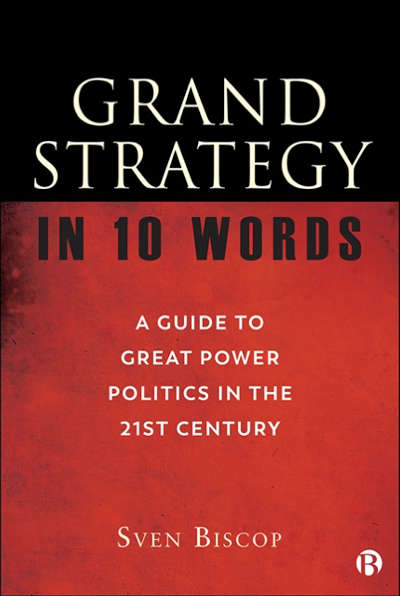In the picture
Cover of Sven Biscop's book 'Grand Strategy in 10 Words. A Guide to Great Power Politics in the 21st Century' (Bristol: Bristol University Press, 2021) 222 pages.
In a world such as that of strategic programs of study , in which bibliography from the Anglo-Saxon cultural sphere occupies a preeminent place, there are not many titles that offer points of view different from those prevalent in the United States or Great Britain. With 'Grand Strategy in 10 Words. A Guide to Great Power Politics in the 21st Century', Sven Biscop, analyst at the Royal Egmont high school for International Affairs in Brussels, makes a relevant contribution, and from a different angle, to the specialized literature. Written during the confinement decreed in Belgium as a measure to fight the COVID-19 pandemic, the book is written by a European who is also a convinced pro-European, as it becomes clear after reading the book.
It is difficult to pigeonhole 'Grand Strategy in 10 Words', other than to say that it belongs to the wide range of works dedicated to the strategic programs of study . Above all, it is an analytical text in which the author studies the strategic behavior of "great powers", which he defines as those with "the ambition to make decisions and the resources to carry out actions with a global impact".
At the same time, however, degree scroll has a significant didactic facet; each chapter is an opportunity to delve into one of the ten characteristics - simple, competitive, rational, allied, comprehensive, creative, agile, courageous, 'dirty' (sic) and proactive - which, in Biscop's own opinion, should adorn any "grand strategy", defined as that which "has to do with the vital objectives that a state must achieve to ensure the survival of its way of life, which justifies the mobilization, if necessary, of all the instruments and resources at the disposal of that state".
With a clear, very attractive prose, and easily understandable for specialists and laymen, the author weaves his arguments, chapter by chapter, in a quite convincing way -despite sometimes tinging them with a certain ideological bias-, following the same expository method in each one of them consisting of beginning by presenting a feature of the grand strategy with a reflection of a theoretical nature, to then analyze how it is materialized in the grand strategy of each of the four great powers defined by him.
Beyond these two purposes, the book also has a prescriptive intent that stems from the writer's concern about the possibility that rivalry between the great powers could lead to armed conflict between them. In Biscop's own words, "one of the aims of the book is to show that the politics of the great powers can take a different path from that of rivalry". The idea, formulated at the beginning of the book, and which may err on the side of optimism, is developed in the chapter on conclusions, and is supported by the author's proposal of four precepts which, if observed, would help to keep legitimate, and not necessarily negative, competition between great powers within tolerable limits of tension that would keep the specter of armed confrontation at bay.
Biscop describes a multipolar - or more properly, "tetrapolar" - world based on the power nodes represented by the United States, Russia, China and the European Union. Without detracting from its validity, this vision of the international system may be somewhat problematic. agreement First, entrance, it overlooks the role of such outstanding actors as Japan or India -to cite just two-, perhaps not "great powers" according to the definition used in the text, but with great influence on the international system. Secondly, the inclusion of Russia in the club of "great powers" is debatable because, if it is true that some indicators -such as its territorial immensity and its enormous nuclear arsenal- clearly place it in this camp, others -such as its demography or the weight of its Economics- would argue against this option. Lastly, considering the European Union, under the present conditions, as a "great power" is more an exercise in voluntarism than a reality check.
It is true that the project integration of member states has advanced considerably, that its aggregate GDP is at the level of those of the United States or China, and even that it is a power with nuclear capability, although to consider that the French 'force de frappe' is at the disposal of the EU is to assume too much. However, integration is still very imperfect, especially in the field of security, and the whole remains a "military dwarf". For all these reasons, considering the European Union as a "great power", understood as a unitary actor capable of defining and putting on internship a coherent and comprehensive grand strategy worthy of the name, seems somewhat excessive.
These issues are in no way a demerit for a degree scroll which, in addition to having the aforementioned value of offering a different point of view, provides a complete and very useful review of what it means to forge a coherent grand strategy, and which, along the way, discusses the most important strategic issues of the day, from the nuclear agreement with Iran, to the Belt and Road, to COVID or the concept of the "Responsibility to Protect": practically all of them have a place in a very interesting and recommendable work designed by its author under the premise that "understanding the grand strategy [of the great powers] is crucial to understanding the world".

